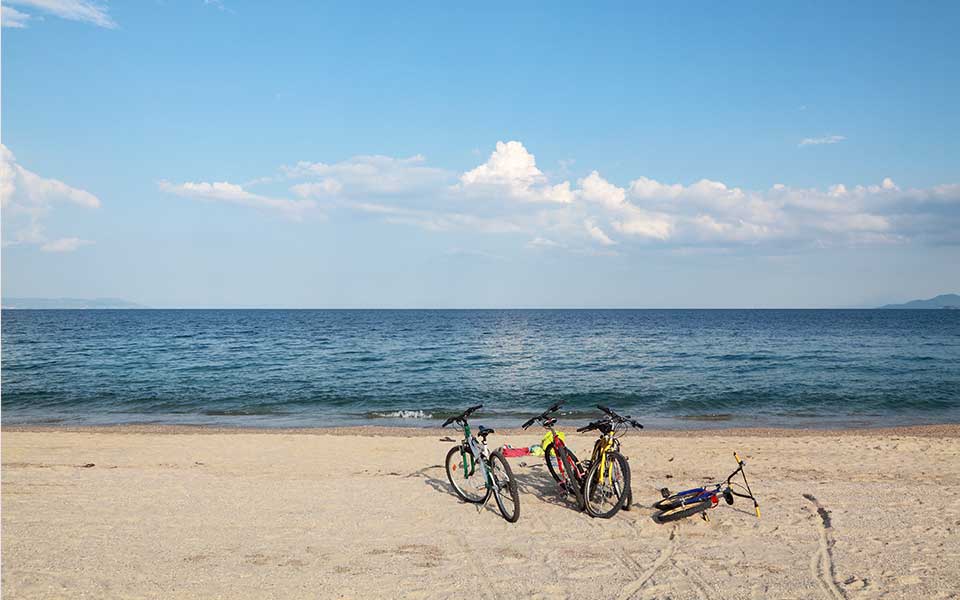That my heart was racing even before boarding my first ferry of the summer wasn’t a case of pre-trip jitters. It was that I had two minutes to get from train platform to ferry ramp, otherwise my trip to Paros would be out the (train) window.
It’s 8:58 a.m. when we pull into the Piraeus Suburban Rail Terminal, and immediately I bolt out of the hall on my bike, fiddling with my helmet strap with one hand, the other steering between zipping taxis to reach the departure gate.
I spot the Blue Star ferry whose engines are already rumbling to leave – I approach within shouting distance, signaling to wait. Manically, I pedal over to the ticket booth to get my boarding passes and Passenger Locator Form issued. “Where’s the kid going?” I hear one of the attendants radio into the ticket vendor. “Paros, he’s coming with you”. I spin around and roll onto the boat just as the sirens wail and the ramp comes up.
Fortune and adventure do favour the bold.
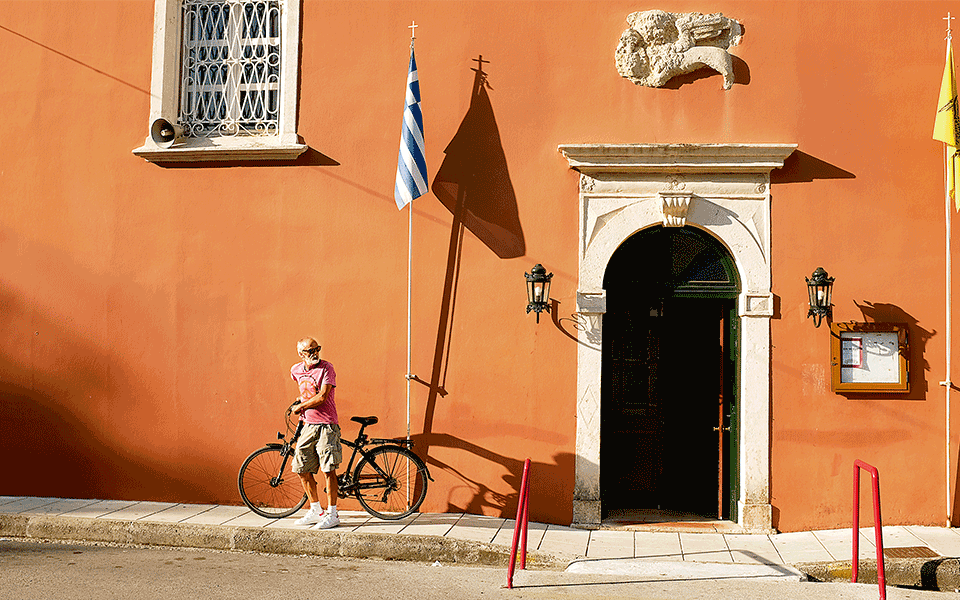
© Nikos Kokkas
The Interrail and Eurail Greek Islands Pass
Trains and bikes are not only a romantic pairing for slow travel, but a practical one too, in that they combine long and short treks over land. When it comes to Greece’s rail coverage, you’ll find TrainOSE’s network primarily runs from Alexandroupoli in the northeast, through Thessaloniki before dipping down through Central Greece until Athens; with other offshoot lines to destinations like Meteora.
Traveling by train may not be top of mind with visitors to Greece – and even less so investing in an Interrail pass. However, the little known Interrail and Eurail Greek Islands Pass offers unbeatable value for ferry travel for island hoppers throughout the Aegean and to Italy. Pricing starts at €68 for youth up to 28 years of age, and €90 for adults, which comes close to the price of a normal roundtrip fare.
But instead of just traveling to one island and back, the Greek Islands Pass allows for 4 days of unlimited ferry travel within a 30-day period, on the Attica Group ferry network (the most comprehensive in Greece). Intrepid travelers can even plan a day-long layover – for example, on Naxos arriving from Piraeus, and leaving the same evening to Santorini – using only 1 of your 4 travel days.
Like other Interrail and Eurail passes, the value is hard to beat for independent travelers, with the same flexibility to book tickets on the fly as you would on a rail pass (although bear in mind that during the high season tickets can get scarce to popular islands). Take your pick of ferry trips on Blue Star or Hellenic Seaways boats, as well as on the Anek overnight boats to Crete from Piraeus. And you can even upgrade your pass to include a roundtrip journey out of Venice, Ancona or Bari.
Best of all, bikes travel for free on all ferries, with no dismantling or heavy lifting necessary as bicycles are simply stored in the vessel’s garage.
What is lacking in biking infrastructure across Greece (think potholes and unpaved road shoulders) is easily made up many times over in delightful surprises for cycle tourists. The beauty of ‘slow travel’ by bike comes in those indelible memories from slowly soaking in the landscape, getting lost on a detour and, of course, pulling over as often as you and your travel companion would like for a dip in the sea! It’s a whole other connection to your destination when you set your own pace, and take in its sounds and smells without the barrier of a car or bus window.
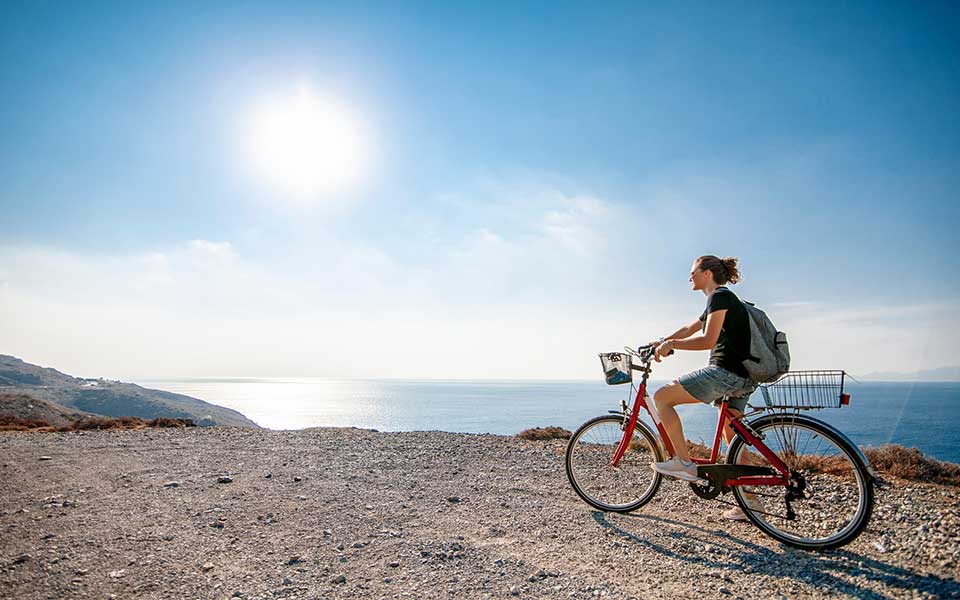
© Shutterstock
How do I get a bike to/in Greece?
When it comes to outfitting yourself with a bicycle, the simplest option for day trips is to rent at your destination (be sure to inquire ahead of time with your hotel or call local scooter rental agencies to see which bicycles they have on hand and to make reservations). For more adventurous cyclists, purchasing and reselling a bicycle can often be the most economical and practical option for multi-day bike tours and one-way trips ending at another destination.
For buying and selling your two wheels in Greece, your best bets are local bike shops, or online marketplaces such as on Facebook or the trading platform car.gr. Bringing along your own specialty pedals and cycling shoes, in addition to bike touring accessories (bike bags, mount, lights), means that you’ll be set from day one of your journey. Of course, major and budget airlines are happy to fly your own touring bike too, provided that you take care of packing it into a bike box.
With your bicycle and Greek Islands Pass in hand, there are literally countless possible itineraries to choose from and it is worth setting your sights beyond the most famous islands.
Below are three calmer and less-traveled destinations, each of which promises a memorable cycling trip and can be reached on your Greek Islands ferry pass.
3 alternative islands to explore by bike
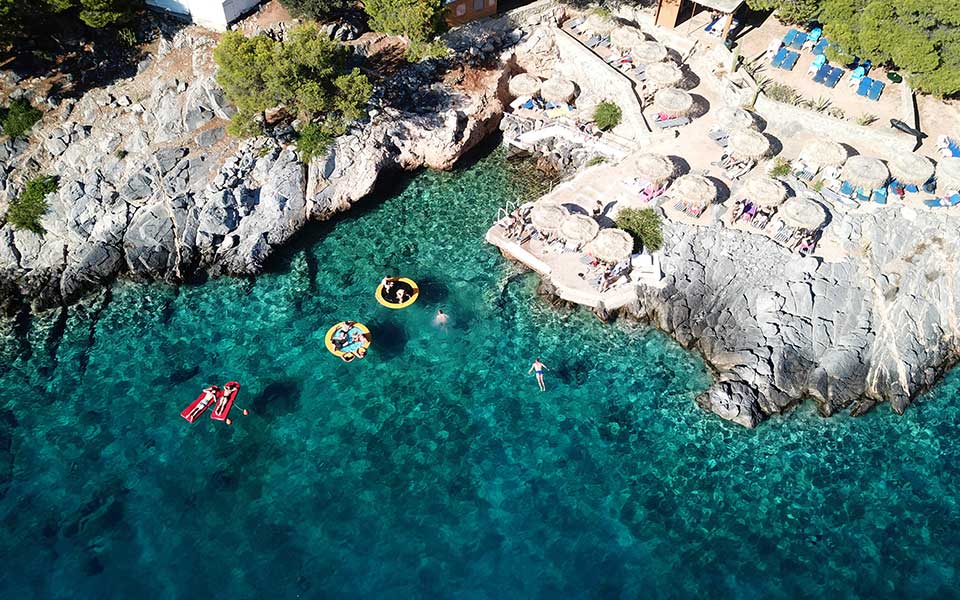
© Shutterstock
Agistri
As a first cycling foray from Athens, Agistri in the Saronic Gulf is a quieter and understated companion to Aegina. Just an hour’s journey away by hydrofoil and covering less than 14 square kilometers of relatively flat terrain, you can feasibly see all corners of the island by bike and continue your trip to another Saronic Gulf destination the very same day – ensuring top value for your ferry pass.
If you’re not bringing your own wheels, you’ll likely want to stop by Logothesis Rent a Bike in Megalochori after stepping off the boat. Then take to the car-less promenade linking the port with the vacation outpost of Skala to the east. Continue the gentle ascent into the pine forests wrapping south towards Halkiada Beach. Your sturdy footwear will come in handy when navigating the descent to this striking pebbled beach, with a de facto clothing-optional policy.
In case you haven’t brought a picnic lunch, a dazzling view and light fare await at the beach bar in Aponisos, some 10 kilometers in the southwest corner of the island. If your visit allows for it, make your last stop at secluded Dragonera Beach to catch the sun as it dips below the horizon.
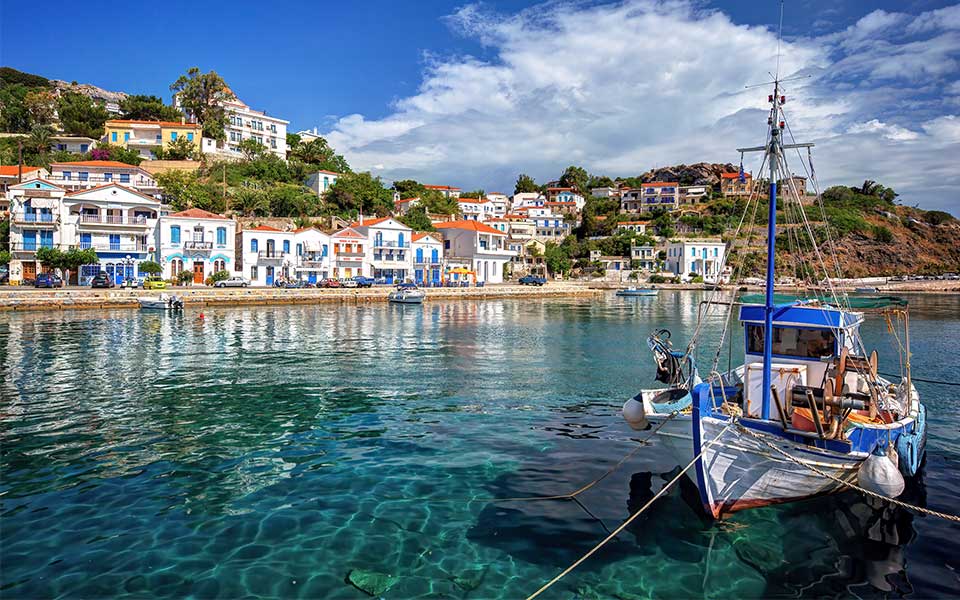
© Shutterstock
Ikaria
Ask Greeks about Ikaria and you’ll often hear anecdotes about a disregard for time – where business opening hours follow no particular schedule and where inhabitants even seem to have put off dying indefinitely, as evidenced by an impressive number of centenarians. It’s an idyllic place to break free from any routine – but be warned that the island’s topography and wind gusts will have you picking up your pace at times.
If you decide to stick to the north side of the island, you’ll arrive through Evdilos, a terraced town hiding stately manors and two charming wood-fired bakeries. Moving westward, reeds hug the road as you pass through Kampos, not long before reaching the sandy stretches of Mesakti, Armenistis and Nas beaches.
On the south side of Ikaria, you’ll be set up with spring water and orchard fruit by hostess Stella at Zacharoula Rooms in Maggenitis. This laid-back village deserves more than a night’s stay to have the chance to stop by the central cafe-general store for some tsipouro and mezes, to swim at Firodi Beach, but foremost to envelop yourself in the easiness of Ikaria. It’s a short ride east to access the ethereal Seychelles Beach with its eye-searingly blue waters.
Snaking along the coast, make a stop in Aghios Kyrikos to marvel at artifacts dating back to Paleolithic times at the island’s archaeological museum, and in Therma to rub elbows with fellow travelers in the namesake hot spring.
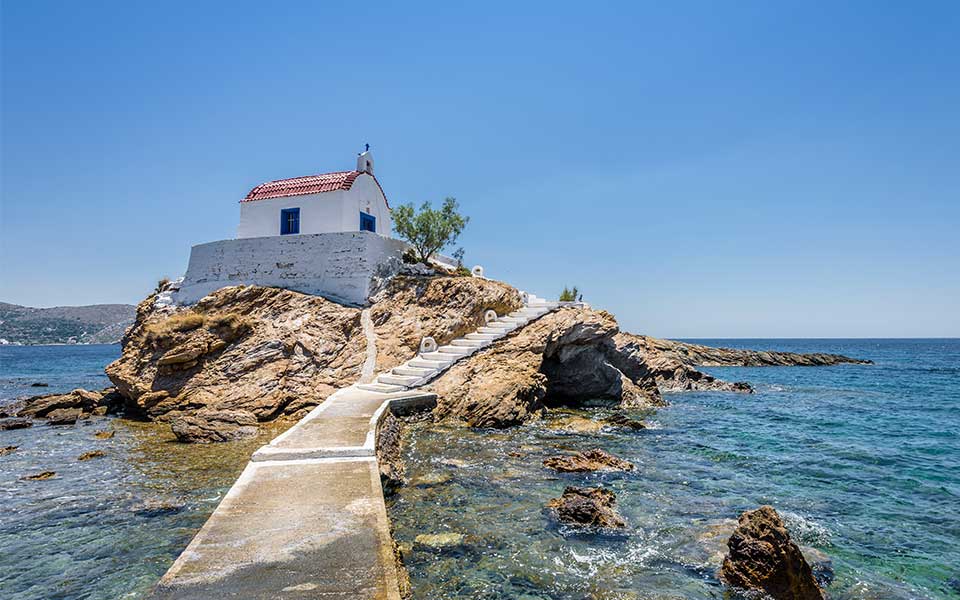
© Shutterstock
Leros
Leros’ unusual patchwork of towns and histories only adds to the charm of this often passed-over island in the Dodecanese. Architecture buffs can indulge in exploring the Italian Rationalist and Fascist style buildings commissioned by Mussolini in Lakki – which can almost feel like pedaling through a Hollywood backlot. Wrapping around to the north side, Panteli and Agia Marina are best explored on by foot as you scale up to the windmills and Kastro before returning to the waterfront for a seafood meal at Mylos.
The vegetarian brunch at Archontiko Angelou is practically made for cyclists. Homemade breads, yogurt and protein-rich chickpea pancakes figure into owner Marianna’s breakfast spread, all served in a gorgeously landscaped garden. To the north past Leros’ airport, hide the calm waters at Aghia Kioura. Make a point of visiting the chapel above the beach, with murals and ecclesiastical paintings done by political prisoners once held on the island by Greece’s military dictatorship (1967-74).
End one of your days with a visit to Aghios Isidoros at sunset, as this secluded church and the bay get painted in a palette of warm colors. Then, follow the coastal road to Ouzeri Sotos where a tantalizing selection of seafood awaits – each urchin, clam and mollusk is smoked, baked, steamed or served raw as carefully considered by the welcoming staff.

